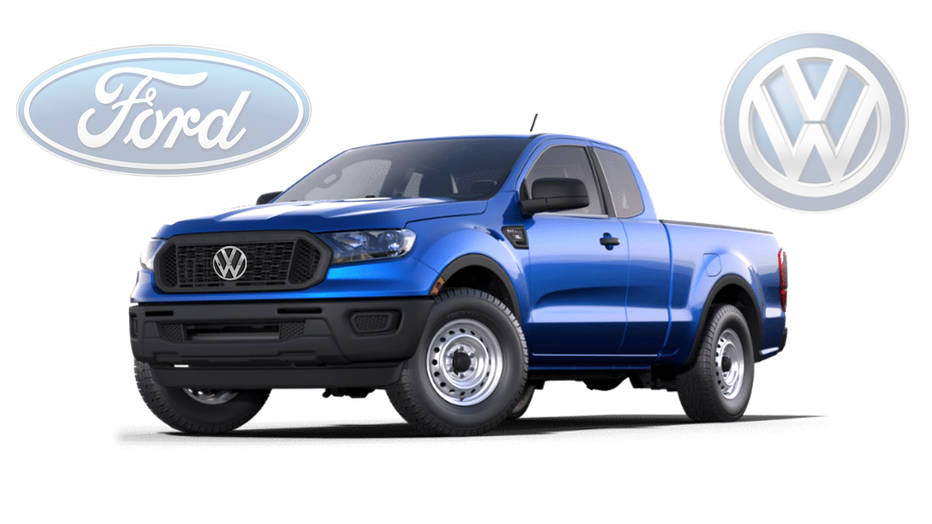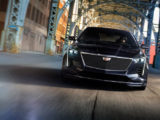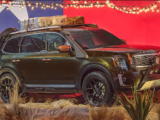
VW And Ford Are Teaming Up For Vans and Pickups
January 15, 2019After months of rumors about a partnership, Volkswagen and Ford said that they will work together on midsize pickup trucks and commercial vans and will explore collaboration in the areas of electric vehicles and autonomous tech. The partnership will not involve cross-ownership — the two automakers won’t acquire stakes in each other — but will rather be focused on taking advantage of sharing development and production costs.
“Volkswagen and Ford will harness our collective resources, innovation capabilities and complementary market positions to even better serve millions of customers around the world,” Volkswagen CEO Dr. Herbert Diess said. “At the same time, the alliance will be a cornerstone for our drive to improve competitiveness.”
Under the partnership, Ford will develop midsize pickups based on the Ranger and large commercial vans based on the Transit Custom for both automakers. Meanwhile, Volkswagen will build a small city van, similar in size to a Transit Connect, for both automakers. This means VW will get its own version of a new global Ranger model, as well as commercial vans large and small.
Such a partnership between the two companies is not without precedent, as in the 1990s the two auto giants teamed up to build vans for Europe and other markets, which resulted in models such as the Ford Galaxy, Volkswagen Sharan and the SEAT Alhambra. But at the time the companies remained competitors in the commercial van market, as the Ford Transit commercial van competed against the Volkswagen Transporter in Europe and other regions. The passenger van collaboration, which saw all three models produced in Portugal, allowed Ford to market a minivan more suited to European tastes, but none of the three were sold in North America per the agreement so as not to compete with Ford and Mercury’s American-market minivans.
The midsize pickup truck side of the partnership will allow Ford to offer a greater range of midsize pickups in global markets. Since 2011, Ford has sold the Australian-built Ranger as a global midsize truck in a number of regions, but not in North America (until last year) where the model is positioned below the F-150.
Ford’s F-150, despite being a big seller in the U.S., is not offered in many other crucial markets as it is essentially too tailored to North American buyers.
Volkswagen entered the midsize truck segment relatively recently with the Amarok in 2010 — not sold in the U.S. or Canada — which has allowed it to field challengers to a number of Japanese pickups that have been in this segment globally for some time.
The agreement comes amid a large-scale cost-cutting campaign by Ford in Europe: The automaker is aiming to eliminate thousands of jobs, close several plants and cut a number of models from its lineup amid sales that have declined or stayed steady during this decade. Ford’s losing streak in Europe has not motivated the automaker to invest more in standalone models for Europe, just as it cuts back sedans and passenger cars back in the U.S.
“Over time, this alliance will help both companies create value and meet the needs of our customers and society,” Ford CEO Jim Hackett said. “It will not only drive significant efficiencies and help both companies improve their fitness, but also gives us the opportunity to collaborate on shaping the next era of mobility.”
Ford and Volkswagen’s plans to collaborate in the sphere of EVs and autonomous cars are a little more nebulous at this point; the companies have agreed to “to investigate collaboration on autonomous vehicles, mobility services and electric vehicles.”
VW is believed to be ahead of Ford when it comes to electric cars, with the first EVs from the ID lineup due to land in the U.S. in 2020. This week Volkswagen also announced that it will produce EVs in Chattanooga, Tennessee, starting in 2023. When it comes to its own electric cars Ford announced earlier that it plans to invest $11 billion in EVs by 2022 and has hinted that it has something in the wings for next year (believed to be an Escape-sized electric SUV with a range of 300 miles, with styling inspired by the Mustang).
For Ford, this partnership could result in access to Volkswagen’s electric MEB platform for a number of passenger vehicles during the 2020s, but the two companies are staying quiet about the specifics of collaboration on EVs.



